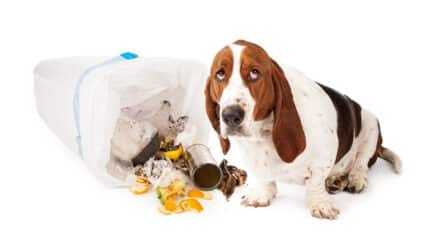Can dogs eat cottage cheese? You might be asking yourself this question if your pup licked your bowl of leftovers when you weren’t looking. Cottage cheese is a fresh cheese made from drained cheese curds. It goes nicely with fresh fruit as a breakfast food or snack. You may have seen it recommended as an addition to a healthy diet for people.
It can provide a digestible source of protein and contains many essential vitamins and minerals. But is it the right type of food for your dog? Will it cause constipation, gas, or other types of gastrointestinal upset? While most cheeses are safe for dogs, it only makes sense to do your research before feeding your pup something new.
In most cases, cottage cheese is generally safe to feed to dogs. It’s even sometimes recommended for dogs with digestive problems. But that may not be the case for all dogs, including yours. Read on to find out if feeding this to your pup is the right thing to do.
Is Cottage Cheese Good For Dogs?

In some scenarios, it’s a top choice in addition to a dog’s diet. Dogs hospitalized with digestive issues can’t always eat regular kibble or canned diet.
The high digestibility and good protein level ensure these digestively challenged dogs will be getting some of the nutrients they need without having their gut work overtime. There are even low-fat versions available that can be used in patients who may not be able to properly digest dietary fat.
It is important to note that, in these scenarios, it will only be fed for a short amount of time during hospitalization. Long-term changes to the main diet should be done in consultation with your veterinarian, especially when considering a dog with a health problem.
How Much Can I Give My Dog?
Cottage cheese is not a completely balanced source of protein and other nutrients on its own. It can be used as a treat or snack but should not make up more than 10% of your dog’s daily calories.
While it may be possible to feed it to your dog as a bigger part of the diet over the long term, this should only be done under the guidance of a board-certified veterinary nutritionist. They have the expertise to formulate a menu using preferred ingredients while ensuring that nutritional needs are still met.
However, any nutritionist will tell you that it isn’t only about the ingredients when formulating a diet! Dogs need nutrients, not ingredients, to stay healthy. Ingredients only act as a tasty vehicle to get the essential amino acids, vitamins, and minerals into the gut for absorption.
With that in mind, unless your dog has a veterinary nutritionist on board to formulate their diet, you shouldn’t give more than a tablespoon a day.
Dogs & Lactose Intolerance

A small amount each day is all your dog should get from you as a treat. Lactose is a type of sugar found in milk and dairy products. Newborns produce the enzyme needed to break it down, but they eventually lose the ability to make it after they stop drinking their mother’s milk. High levels of lactose in the diet of an adult dog can lead to an upset tummy.
The production process includes a fermentation step where bacteria break down lactose. Fermentation means it will contain a lot less lactose than many other dairy products and should be okay to be consumed by even adult dogs.
Health Benefits
There are currently no scientific research studies showing any special health benefits specifically in dogs. Some cheese brands may contain probiotics, or natural bacteria found in many fermented food products. Probiotics have been shown to improve gut health in multiple canine studies.
You should keep in mind that probiotics tend to have their biggest impact on dogs that are ill or have just finished receiving a course of antibiotics. If you are interested in adding probiotics to your dog’s diet, it is best to consult with your veterinarian to see if it’s the right choice for your pup.
Is Cottage Cheese Bad For Dogs?

Cottage cheese is often very salty when compared to other foods. High levels of salt in the diet can cause an uncomfortable thirst and even lead to sodium toxicity.
Choose a “low-sodium” or “no salt added” version if you want to feed it to your dog regularly. It is unlikely your furry friend will notice much of a difference when compared to the “regular” type anyway!
It can also be high in fat which will increase the calories in each portion. Highly calorific treats can lead to obesity which can be a precursor to many health problems such as diabetes and osteoarthritis.
A “low-fat” version will allow your dog will be able to fit more into his daily treat allowance and stay trim over the long term.
Will It Cause Gas Or Constipation?
Any sudden changes in the diet have the potential to cause diarrhea or gas. If your dog is trying it for the first time, or for the first time in a few weeks his gut might be sensitive to this ingredient. If you notice that your dog has diarrhea for longer than a few days, you should consult with your veterinarian.
A gassy dog is not necessarily a reason to book an emergency appointment. It could be indicative of health issues and may require a special diet. Ensure you mention it at your dog’s next check-up or book a visit if it gets to the point of being
It is also unlikely to cause constipation in your dog. If you notice that your dog has not had a bowel movement for longer than 48 hours, you should speak to your veterinarian to discuss a visit.
Frequently Asked Questions
Will cottage cheese settle a dog’s stomach?
If your dog is showing symptoms of gut upset for longer than 24 hours, they should see a veterinarian. It could be a sign that there is a serious clinical problem present. It is tempting to try some home remedies when your dog is not feeling his best, but sudden dietary changes could worsen the issue. It is best to check with your vet who can run the appropriate diagnostics to pinpoint the problem and create a specific treatment plan.
Is cottage cheese good for diabetic dogs?
Speak to your veterinarian when considering making any changes to the diet of a diabetic dog. Any extra foods, even those that are low in carbohydrates can have a big impact on insulin levels. It is so important to not deviate from the feeding schedule and food you chose with your veterinarian.
Remember, finding the right insulin dose for a dog can be difficult, and it’s likely you had several visits to find the right dose for your dog and for their diet. Changing their diet, or adding to it, can upset this balance and cause their diabetes to become uncontrolled.
Oftentimes, the best diet choice is a complete diet that is purchased commercially. These diets are very consistent in their nutritional content and it will be easier to pair the right insulin dose with each meal.
Will cottage cheese help my dog’s dry skin?
There is no evidence that it will have an impact on the skin of your dog. If you are concerned about a skin condition, have a chat with your veterinarian. They will either be able to create a diagnostic plan for your dog or can refer your dog to a dermatologist.
Is cottage cheese good for lactating dogs?
Lactating dogs can certainly use more calories in their diet, but this should come from a balanced food source. It is possible to create a diet for a lactating dog using cottage cheese, but this should be done in consultation with a board-certified veterinary nutritionist.
Some people think the calcium inside it makes it more suitable for lactating dogs, but calcium is one of the most important nutrients to have in balance with other nutrients, as nutritional problems can develop in mum and puppies if this balance is off!
There are also many commercial diets that are specifically formulated to support the demanding nutritional needs of new mothers. Look for the Association of American Feed Control Officials (AAFCO) statement on the label that specifically mentions the suitability of the diet for lactation.
What are some cottage cheese alternatives?
It may be difficult to give this to your pup as a treat because of its high moisture, texture, and need for refrigeration. It is probably not one you’ll want to bring to the dog park for a training session. There are many commercial treats available that have a cheesy flavoring that your pup will love.
Dry biscuit treats can be easily kept in your pocket for easy access during training or playtime and it will be easier to gauge how many calories your dog is getting with each bite. The calorie count of treats can often be found on the package.
Final Thoughts
Cottage cheese can certainly be given to your dog as a treat, but it shouldn’t make up more than 10% of your dog’s daily calories unless you’ve consulted with a board-certified veterinary nutritionist!
There are also sometimes when letting your dog eat this isn’t a good idea. You should never feed it to a dog that’s demonstrated lactose intolerance, for example. Hopefully, you’ll now have a better idea of the benefits and possible alternatives before you share your breakfast bowl with your pooch.






Yeh… vets are retarded. Dogs with sensitive stomachs can’t eat toxic kibble…. hmm…. I wonder why? 🤔 maybe because bird beaks and feathers heated into a mush at 400 degrees doesn’t sit well with them? Who knows? Just maybe?